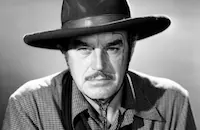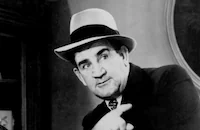-Groucho Marx, Monkey Business
Sanity flew out the door, allowing non-stop hilarity to come "innuendo," when the Marx Bros. starred in Monkey Business, their first Hollywood film in 1931. After two pictures adapted from their stage hits-both shot in Paramount's Astoria, Long Island studios while the comic team was performing on stage at night-the brothers Marx worked from an original screenplay for the first time, setting new standards for on-screen anarchy.
Though Monkey Business was a huge hit that marked the beginning of the Marx Brothers' love affair with Southern California, it also launched a controversy that would haunt the team, and particularly Groucho, to this day - the question of writer S.J. Perelman's contribution to their careers. Later writers have gone so far as to claim that the entire Groucho persona had been modeled on Perelman (it was actually refined by Groucho with the help of writer-director George S. Kaufman). For his part, in later years Groucho claimed that all but a few lines of Perelman's work remained in the two films he wrote for them - Monkey Business and Horse Feathers - insisting that Perelman was too literary to write effective screen comedy.
While they were still working on Broadway, Groucho came across Dawn Ginsbergh's Revenge, a new novel by the young writer S.J. Perelman. He sent the author a complimentary letter and invited him to meet him backstage. There, he asked Perelman if he would be interested in writing for the Marxes. His first assignment was to team with W.B. Johnstone, who had written their stage hit I'll Say She Is! to write a radio script for them. At first, the writers were daunted by the idea of putting the team on the radio, particularly as Harpo never spoke. During a story conference, however, they handed over their one idea - the Marxes as stowaways on a luxury liner. Groucho was so impressed he decided to make it their next film and paraded the writers to Paramount Pictures' New York business office to sign contracts.
The jovial atmosphere didn't last long. When Perelman arrived in Hollywood, his producer, Herman J. Mankiewicz, warned him about working with the Marx Brothers, "They're mercurial, devious and ungrateful. I hate to depress you, but you'll rue the day you ever took the assignment. This is an ordeal by fire. Make sure you wear asbestos pants." Perelman found out how right he was when he read the first draft to them. According to legend, Groucho responded to it with two words, "It stinks." Writer Ned Tennant, who contributed some uncredited gags to the script, offers another, though no less scathing, response from Groucho: "I think we need a script."
For the next five months, they incorporated suggestions from a variety of gag writers, along with the Marx Brothers themselves, Mankiewicz and director Norman Z. McLeod. During filming, the script changed even more as the brothers improvised. McLeod quickly learned that when they started to ad lib, he should just let the cameras roll until they got tired. Often, he thought they came up with better material than what had been scripted.
Throughout Groucho complained that Perelman's writing was too literary. When he rejected a reference to the operetta The Student Prince, his comment was, "The trouble is that the barber in Peru won't get it," referring to the small town of Peru, Indiana. Although another Marx Brothers writer, Arthur Sheekman, got the actual screenplay credit, a good deal of Perelman's work remained.
For all the chaos, however, the film was a huge success for everyone involved. Its impressive box-office performance established the Marx Brothers as major film stars and helped all of the writers find more work in Hollywood. Perelman did not stay for much longer, however, preferring to work on his own projects in New York. But as his name grew in literary circles, some people began giving him more credit than he deserved or would have claimed for himself.
For decades, this didn't seem to affect his relationship with Groucho. The two remained friendly, often visiting each other and even doing a joint interview in the '60s with critic Kenneth Tynan. It wasn't until his final years that Groucho began expressing his resentment at the undue credit he felt Perelman had been given. In some interviews, he referred to him as the worst writer ever to work for the Marx Brothers. He was more generous, however, in his last statement on the issue. In The Grouchophile he wrote, "...he is a great writer with a brilliant comic mind that didn't always mesh well with the lunacies of the Marx Brothers."
Producer: Herman J. Mankiewicz
Director: Norman Z. McLeod
Screenplay: Arthur Sheekman
Based on a story by S.J. Perelman, W. B. Johnstone & Ronald Pertwee
Cinematography: Arthur L. Todd
Music: Ralph Rainger, Leo Robin, Richard A. Whiting
Principal Cast: Groucho Marx (Groucho), Harpo Marx (Harpo), Chico Marx (Chico), Zeppo Marx (Zeppo), Thelma Todd (Lucille), Tom Kennedy (Gibson), Ruth Hall (Mary Helton).
BW-78m. Closed captioning.
by Frank Miller



























